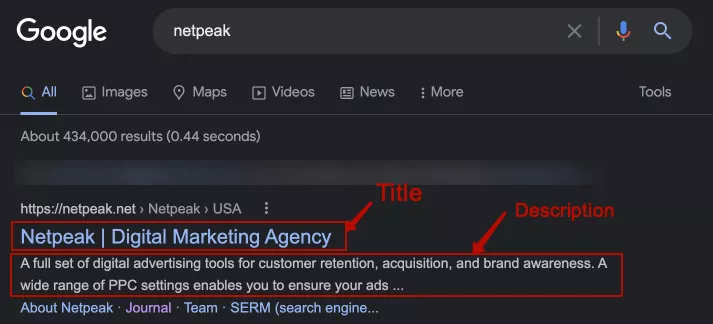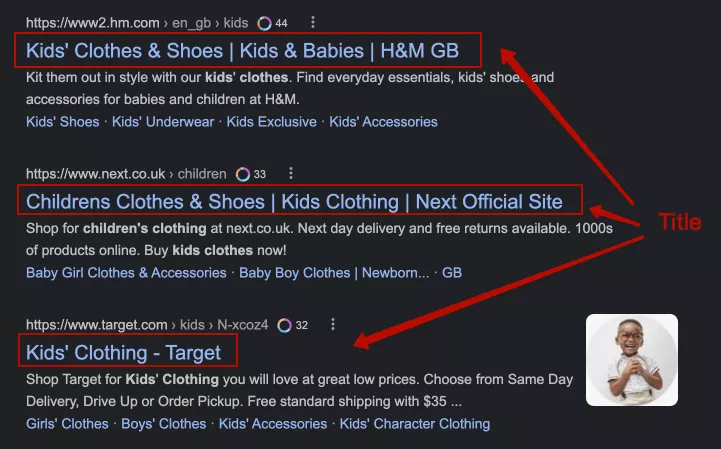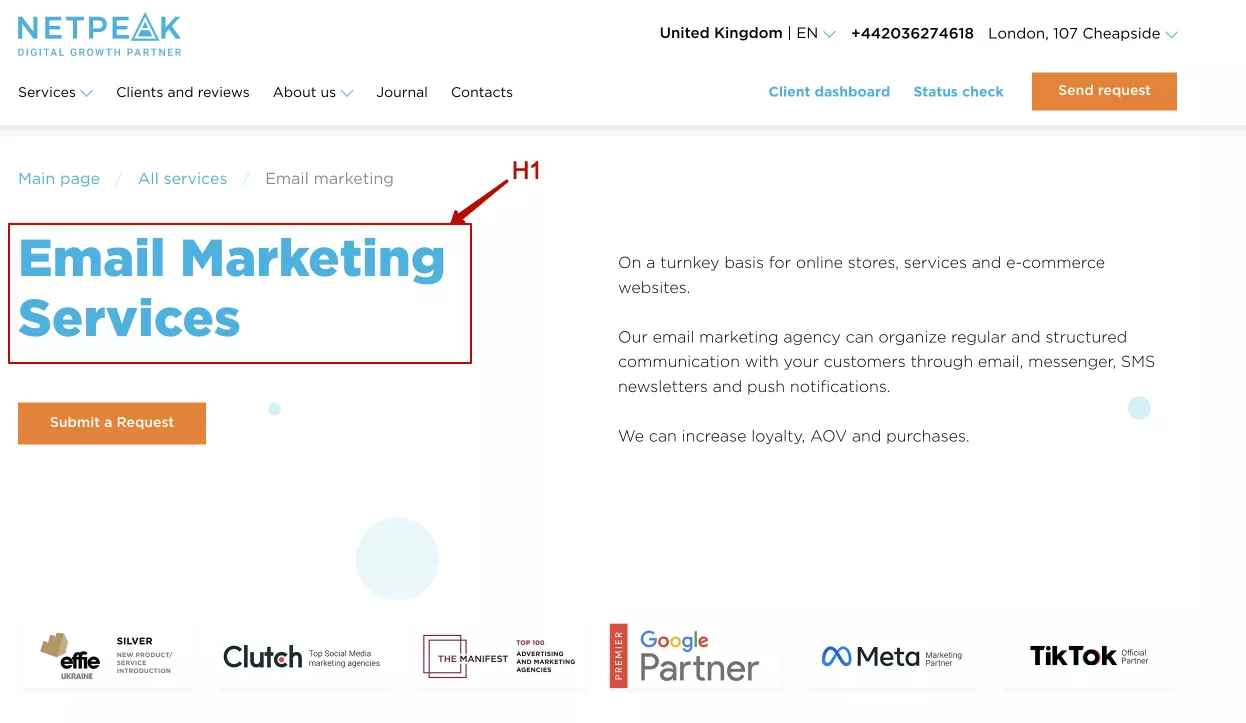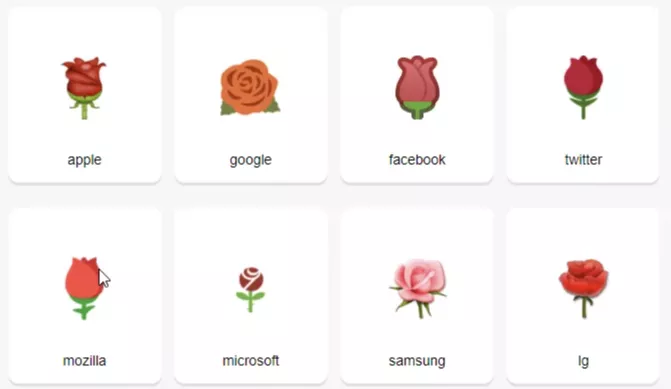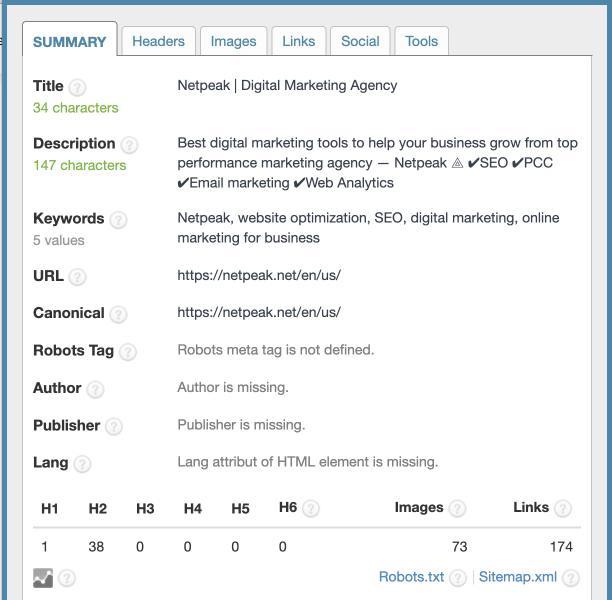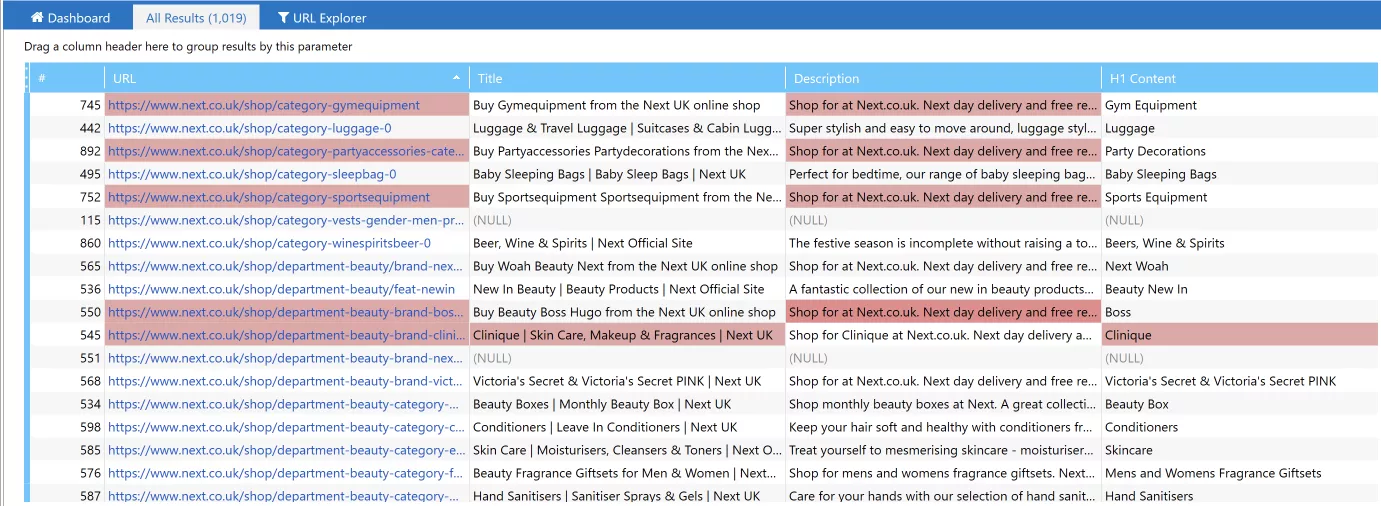How to Optimize Metadata for SEO – Title, Descriptions, H1
In this post let’s discuss the important tags and meta tags that are pieces of the HTML code of a document and include the information about the content on the page. They are one of the factors that impact the ranking in search engine results and define the website content.
We will talk about four basic elements:
- title;
- description;
- keywords;
- H1 header.
Why is metadata important for search engines optimization
Metadata was created to tell search engines about the content of a page, but after the improvement of search engine algorithms have become only a factor in determining the content of the site. All metadatas have a different meaning, application and features.
Meta tags usually but not obviously are shown into a snippet in the search engine results:
This information helps the user to decide whether to click on a link or continue searching and select more relevant information. Search engines pay attention to the meaning of page overview, such as the content of headers and metadata. They are one of the factors in forming the search results for a target user’s query.
However, for a web page to be relevant, first of all you need to understand how it can be searched for, and then optimize your website to match the search queries. At the same time, the content also needs to match the point of the page itself, otherwise the visitors who click on the link will not get the information they expect and will leave the website.
The main features of metadata:
- metadata helps the website to appear in search results for relevant queries;
- metadata attracts visitors;
- metadata informs about the content of the page.
What is the Title Tag
Title is a coherent, meaningful sentence in the HTML code and displayed as a page title in the search results:
Recommendations for Title tag optimization:
- the Title tag should include the high search volume keywords which are relevant to target queries;
- the keywords in the Title tag should be placed closer to the beginning of the sentence. It is recommended to add the phrases that people can use for searching the information on the webpage;
- at the same time all keywords in the title tag should be unique and without repeating. Try to use different keywords or synonyms instead of a single keyword repetition. Keyword spamming in the title like the repeating of words has a negative impact on the site's ranking;
- title should be unique within the site – this is another feature of this tag. To check the uniqueness of the title there are different crawling methods.
What is an H1 tag
H1tag, a text markup element in HTML, is an important part of on page search engine optimization. It affects the definition of topics by search engine bots no less than meta tags. H1 can contain the same keywords as the title and summarize the content briefly.
The most important recommendations for H1:
- the H1 is the header that users see at the top of the page itself, not in search engine results;
- we recommend using the H1 tag only once per page, as it is the main page header.
- the H1 tag should use the most high search volume keywords in direct entry;
- it should not contain more than 7 words, keywords should be placed closer to the beginning of the sentence;
- if there is more than one item on the page, the H1 header should be in the plural;
- H1 tag can be displayed in search results snippets.
Try H1 checker for creating the most efficient headings.
What is Description meta tag
Description is a brief information of a page that summarizes a website's competitive advantages and encourages clicks in search results.
This is a meta tag with additional information about the page. It consists of two attributes: name and content.
Description should include:
- keywords;
- topic that is relevant to the content of the page;
- attractive wording;
- a unique selling proposition;
- advertising component.
The Description meta tag does not directly affect the ranking of the site by search engines. However, it is important to note that correct Description will greatly increase CTR (Click-Through Rate – the ratio of clicks on the link in search results to the total number of its displays), which in turn may increase your ranking in SERP.
Description should be interesting to the user, because it is often displayed in a snippet and can affect the number of visits on the page from organic search.
To make description more attractive, use unicode characters like asterisks, phone numbers and other images:
This is how the characters will appear in the search results:
Do not get too involved with special characters. A large number of these colored elements can look ridiculous and scare away potential customers, especially in the niches of large businesses. A few pieces will be enough to form an attractive description.
What is Keywords meta tag
Keywords is a meta tag that shows a page's main message. It, as well as description, contains name and content attributes. For this meta tag It is recommended to add keywords (separated by commas) that summarize the meaning of the page and do not overlap.
Do you need keywords today? Not for Google. Google announced back in September 2009 on the official Webmaster Central Blog that keywords will have no influence on ranking in their search engine. But they could be useful in promoting in other search engines.
Keep in mind that Google can punish overspam in this tag. Therefore, more and more SEO-specialists prefer not to fill in the meta tag Keywords.
How to create the metadata
In HTML document meta tags are written down as follows:
And this is how it looks like in the HTML code of the page:
How to optimize metadata (example)
To ensure that all pages have unique metadata, there are a few rules to follow:
- Prescribe meta tag generation templates. Templates are used in online shops to optimize the meta tags for:
- category pages;
- filter pages;
- product cards;
- any sections with a large number of identical pages.
Let’s take the online store as an example.
For page https://site.com/category there could be the following metadata templates:
Title: Shop the [Category name], Offers&Prices | [Store name].
Description: Order [Category name] with free delivery to [Country or City name] ✓ High quality ✓ Affordable prices ☎ 8-000-000-00-00 Call!
H1: [Category name].
- Write down the meta tags manually:
- for the homepage;
- to optimize selected pages;
- if meta tags templates cannot be applied.
The main recommendations for metadata optimization:
|
Name |
Length |
Function |
Feature |
|
Title |
Up to 70 characters (displayed in SERP), main keywords in the first 50 characters. Visible length – 600 pixels. |
Page title. Has an impact on ranking for the target queries in the SERP. |
Should be unique, readable, without keywords spam and repetition. |
|
Description |
From 70 to 155 characters – about 15 words. |
The description of the page. Helps to ensure clickability, should interest the user. |
Reveals the competitive advantage, do not duplicate the title. |
|
Keywords |
5-7 keywords that describe the point of a page. |
Previously, it helped search engine bots to understand the meaning of the page, but now affects the ranking only in some search engines. |
Keywords should not be repeated. |
|
H1 |
Up to 7 words. If the header is longer, put the keywords closer to beginning for better understanding by search engine bots. |
Contains keywords or their synonyms, helps search engines to recognize the meaning of the text. |
Only one for a particular page. |
How to check the metadata on the page
There are a huge number of tools to view the meta tags of a website's pages. Let's look at the most famous ones.
Online tools for checking metadata
1. Browser Plug-in: SEO Meta in 1 Click
2. Bookmarklet: Meta Tags
Both tools allow you to check basic on-page parameters at the click. However, they are not suitable for more than one page.
Checking the metadata by Netpeak Spider
The main advantages of Netpeak Spider are the ability to perform mass analysis of any number of URLs, detect missing meta tags and duplicates, and the ability to export the data for further work.
Conclusions
- Description and keywords are meta tags with additional information about the page. They contain two attributes, name and content, which include the title of the meta tag and its content.
- Title and H1 are the simple tags, elements of the markup of text in HTML. But they affect the definition of the topic of the page no less than elements with the prefix "meta".
- Optimized metadata perfectly presents the site, improves user experience, helps correctly recognize the content and quickly find the necessary information, and search engines bots – improve the search results.
- However, a page's description in the snippet can be pulled from the description meta tag as well as any part of the text. Therefore, it is better to optimize not only the metadata, but also the rest of the content.
FAQ
Q: What is metadata on a website?
A: Metadata is a piece of HTML code that tells search engines about the content of a page. All metadatas have a different meaning, application and features.
Q: What are the main meta tags?
A: Four basic metatags are: title, description, keywords, H1.
Q: Are meta tags important for SEO?
A: Optimized meta tags help the website to appear in search results for relevant queries, attract visitors, and inform about the content of the page.
Related Articles
Display Advertising Effectiveness Analysis: A Comprehensive Approach to Measuring Its Impact
In this article, I will explain why you shouldn’t underestimate display advertising and how to analyze its impact using Google Analytics 4
Generative Engine Optimization: What Businesses Get From Ranking in SearchGPT
Companies that master SearchGPT SEO and generative engine optimization will capture high-intent traffic from users seeking direct, authoritative answers
From Generic to Iconic: 100 Statistics on Amazon Marketing for Fashion Brands
While traditional fashion retailers were still figuring out e-commerce, one company quietly revolutionized how U.S. consumers shop for everything from workout gear to wedding dresses

